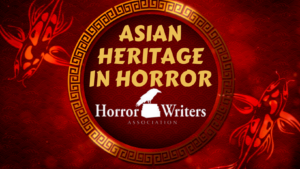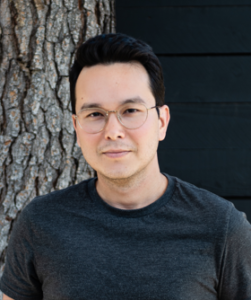Asian Heritage in Horror: Interview with Thomas Ha

 Thomas Ha is a husband, father, and writer, roughly in that order. He primarily writes dark fantasy, with some elements of horror, and occasionally lighter fantasy and sci-fi.
Thomas Ha is a husband, father, and writer, roughly in that order. He primarily writes dark fantasy, with some elements of horror, and occasionally lighter fantasy and sci-fi.
His work often focuses on family, home, and the surreal and disturbing nature of the banal.
What inspired you to start writing?
I’ve written on and off for most of my life, but I don’t think I started writing seriously until the last few years when my kids were born. I know it’s a cliché—that parenthood brings some kind of meaning or clarity—but in many cases, and I guess in my case, it seems to be true.
I realized recently that much of what I write is a kind of invisible, indirect, and long-term conversation with my children. Not necessarily lessons, lectures, or advice in the form of parables. It’s more that, yes, I’m having a lot of straightforward talks with my kids (“Where’d you grow up?” “How’d you meet Mom?” “Why do you have so many freckles?”), but there are just so many mundane and insubstantial things that you rarely talk about that shape the way you understand the world and the people in it. My hope is that through writing—and the timeless form of telepathy that it is—that I might get to have that harder, second type of conversation.
I’m not my protagonists or my characters, but there are a lot of bits and pieces of me suffused in the words and the worlds. And I like to think that if my kids ever want to know more about what I think, feel, or perceive of certain things, it’s all embedded here for them to find if they’re ever curious.
What was it about the horror genre that drew you to it?
The world is terrifying. I’m ill-equipped. I don’t know how to protect myself or my family. There’s a catharsis in giving the fears form and shape.
This is also more reflective of my broken brain than an objective statement, but I just find more reality, or maybe relatability, in terror and dread. Optimistic, triumphant fiction is powerful and important, too, and I respect it. But, for better or worse, I will always pick the dark forest or abandoned house over the brilliant vista or beautiful kingdom.
Do you make a conscious effort to include Asian and/or Pacific Islander characters and themes in your writing and if so, what do you want to portray?
I would say it’s less of a conscious effort and more dependent on the particular story. There are some pieces I’ve written where I thought it very necessary to anchor things to a specific cultural context. There are some pieces where I’ve used Asian characters and concepts because I’m probably defaulting to my experiences, or upbringing, and am filling in blanks with what I know.
But these days, more often than not, I either don’t explicitly include Asian characters or, if I do, do not usually over-explain or emphasize what I’m doing. I’m a strong believer that the Asian diaspora experience is baked into much of what I do, whether I say it is or not, whether I consciously present my work as such or not. The very act of explanation assumes that explanation is required (or owed). More and more, I’m not sure that’s the case. And I’m far from the first Asian writer to say it.
I have had editors encourage me, in fact, to introduce a specific cultural dimension or subplot to some of my previous stories, and I have declined simply because my gut said “no.” It may or may not have been the right call, but it was right for me. I think that’s all we, as writers, can do. Decide for ourselves what makes sense for each story at hand, especially when it comes to accessing personal identity, culture, or history.
What has writing horror taught you about the world and yourself?
I think a common throughline in many of my stories is that I worry that the fear of making the wrong choice leads to no choice at all (which is, of course, itself, a choice).
Much of what I gravitate to in horror is that feeling of being overwhelmed by the threat you can’t confront—the unseeable force, the creeping thing, the presence on the other side of the door. And the subsequent question that logically springs from that: what do you do?
Horror, for me, usually supplies a kind of answer because it’s kinetic. Even when it’s slow and filled with an ominous atmosphere, it moves. People do something. They stay. They go. They fight. They falter. They die.
And I realize there’s some irony that I’m exploring this through writing, which is a relatively passive, introverted act, but I’ve learned more and more that I value choice, decision, and action.
Maybe you think the world is fine and great, but, on the whole, I think most of us do not. So how can you, personally, individually, politically, and socially, confront what overwhelms you? How can I? Writing horror has helped me actively take more conscious steps, make decisions, and take personal actions when it comes to other issues I care about.
How have you seen the horror genre change over the years? And how do you think it will continue to evolve?
This is tough. Horror is so multi-faceted, and I’m a neophyte compared to most. I saw Bruce Campbell give an interview where he mentioned that, at least on the film side, horror has always gone through phases. And that things seemed to have moved past “torture porn” horror and that maybe “elevated” horror is the current trend (though it’s a term he’s jokingly rejected in other interviews). He never comes out and names the current trend in the interview, but does say the heart of horror still lies in the suspense and skill employed in crafting mood and atmosphere. And something about that seemed right to me.
Horror writing is definitely a different beast, and there’s no exact analogue for the “elevated” horror in film. But I do think I’ve noticed a more personal, emotional, almost meditative style that feels like it’s been dominant lately on the writing side too. At the same time, it also feels like messier, gorier, scenario and premise-driven stuff is having a resurgence as well. This is a long roundabout way of saying I have zero clue where things are trending, but it does seem like whether you like cerebral, moody horror, or more gruesome, pulpy horror, there seems to be a lot going on with (and a lot of mainstream interest in) both at the moment.
How do you feel the Asian and/or Pacific Islander communities have been represented thus far in the genre and what hopes do you have for representation in the genre going forward?
I think the trend is generally positive—more Asian authors getting mainstream attention, more intellectual curiosity, and interest in Asian stories from readers.
I hope that as things continue that Asian authors are able to break further out of boxes that non-Asian audiences sometimes put them in. It seems like there’s a tendency for mainstream readers to gravitate toward certain sub-genres, like Asian ghost stories, folklore, and history/retellings. But I think, as time goes on, people are realizing that Asian horror writers have a wider range of stories to share too.
Who are some of your favorite Asian and/or Pacific Islander characters in horror?
I don’t know if it’s just the lapsed Catholic in me, but I automatically think of the main character, Sang-hyun, in Park Chan-wook’s film Thirst—a priest with a good heart that struggles with extreme guilt when he slowly descends into vampirism. Such a multi-dimensional interesting character really wrestling with big dilemmas concerning sickness, religiosity, power, and love—all in a pretty awesome and underrated vampire movie.
Who are some Asian and/or Pacific Islander horror authors you recommend our audience check out?
There are many, and I’m bound to forget many more. But some Asian horror authors whose work I’ve come to know over the last few years are Vanessa Fogg, L. Chan, and Ai Jang. That’s barely scratching the surface, I know, but I feel like if I go further than that, I’d be giving a long list of authors rather than a useful recommendation, so I’m going to stop myself there.
What is one piece of advice you would give horror authors today?
I’m not in a position to give advice since I’m new to speculative fiction, but I do think I can say that, in general, I hope to see authors create more characters in horror that have serious flaws. Not moody soulful heroes, but straight unlikeables.
Dummies, screw-ups, selfish buffoons. I feel like I read a lot of stories where the protagonist or secondary characters are either extremely resilient or the ultimate victims, but not enough where they’re just doing stupid or regrettable stuff. Cowards running away, falling down, failing, reflecting (or not reflecting) on what they’re doing and why. Not everyone has to win or die in a noble fashion. Most people don’t do either.
And to the Asian and/or Pacific Islander writers out there who are just getting started, what advice would you give them?
Again, I don’t feel like I’m in a position to give advice, but I guess what I wish I knew when I started was, a lot of people say, “Don’t write to trends.” And the heart of that advice is excellent—the idea that you should really seek what excites you and not try to explore a certain trope or story simply because it’s popular. That’s definitely true, but I think that advice is incomplete.
Because when you do write what you’re passionate about, what excites you, I think you find out that, unless you’re truly a unique and isolated person, guess what…you’re usually writing as part of a trend. Because you are a product of a culture, a history, an upbringing, that you share with many, many people. So oftentimes, certain themes or ideas that resonate with you, they’re going to resonate with many, many other writers who will likely want to express similar ideas.
I don’t think it’s an accident, for example, that so many BIPOC authors—often, but not exclusively, Asian authors—are writing about intergenerational conflict and inherited trauma. Those issues are playing out in real time right now, in real families, especially in diaspora communities.
But I can see a new writer seeing something like that, hearing “Don’t write to trends” and shying away from an issue that’s been explored in the spec fic world, even if they’re wrestling with some of those ideas.
So instead, I’d say what many others have said, too, which is, “Don’t write to trends, but also don’t run from them.” If that’s what’s on your mind, if that’s what’s weighing on you or driving your words, you should go for it. Every author, every voice, pushes the conversation forward with a slightly different perspective, and if the topic excites you, you should be part of the conversation.



